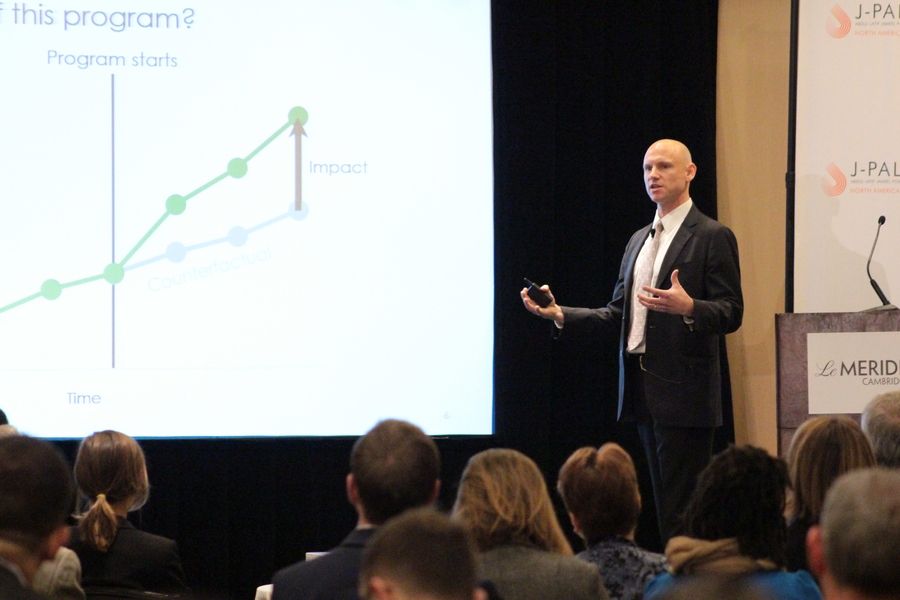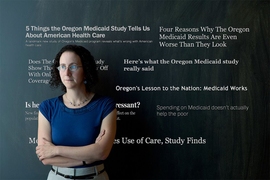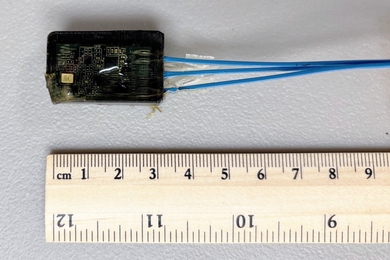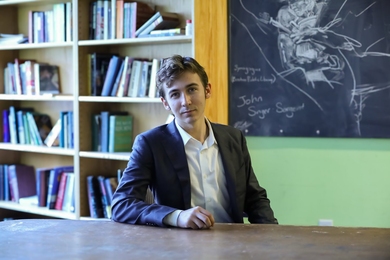Nearly 200 leading health care scholars, practitioners, and providers gathered on Nov. 17 and 18 to discuss innovations in health care delivery and explore how research and evidence-informed policymaking can improve the health of vulnerable populations in the United States.
“Just as randomized controlled trials transformed modern medicine, there is an exciting movement in health policy focused on the use of rigorous evaluation to improve the way we deliver health care,” said Quentin Palfrey, executive director of J-PAL North America, a regional office of MIT’s Abdul Latif Jameel Poverty Action Lab, which hosted the conference. “It was inspiring to connect with so many passionate, committed people interested in building this movement.”
J-PAL North America seeks to reduce poverty by ensuring that policy is informed by scientific research and works to improve social programs by running randomized controlled trials, disseminating policy lessons, and building the evaluation capacity of governments and non-profits.
In the conference keynote address, Atul Gawande, a surgeon, writer, and leading public health scholar, called for simple, scalable, and evidence-informed solutions to improve health care delivery, stating that “the role of evidence will only increase” in the future. Highlighting a “lack of execution”, Gawande cited research finding that among Americans and Europeans who died before the age of 75, at least 30 percent would not have died had they received appropriate medical care for their conditions. Gawande described the work of Ariadne Labs, the health systems innovation center he directs, in developing, evaluating, and scaling checklists that are transforming surgical and childbirth practices globally.
J-PAL North America Scientific Director Amy Finkelstein, a professor of economics at MIT, discussed her landmark study of the impact of Medicaid expansion, which has shaped the policy conversation in the United States about Medicaid coverage. The so-called Oregon Health Insurance Experiment capitalized on a lottery run by the State of Oregon to allocate scarce Medicaid expansion slots to measure the impact of newly acquired Medicaid coverage.
Over a one- to two-year time horizon, the study found (among other results) that Medicaid coverage caused across-the-board increases in health care utilization — primary care, emergency room visits, hospitalization, and drugs — as well as decreased financial strain. Finkelstein applauded the growing use of research leveraging a similar randomized design to examine other high-priority issues in health care delivery, including the effectiveness of coordinated care for high-need patients, bundled payments, and workplace wellness programs.
Ashish Jha of Harvard University spoke about the power of evidence in reforming U.S. health care. Jha called for modernization of health care delivery, increased investment towards innovation, and further research into the impact of new health care practices. Of the $3.2 trillion that is spent on health care annually, Jha noted that only a tiny fraction is available to support innovation and experimentation in delivery.
Highlighting a potentially cost-effective approach, Wes Yin of the University of California at Los Angeles presented new research that found a simple letter reminding individuals to sign up for health insurance caused an 18 percent increase in enrollment (1.8 percentage points), and attracted younger and healthier individuals into the insurance market. Calling it “the lightest touch,” Yin underscored the importance of behavioral factors in insurance decisions.
Katherine Baicker of Harvard University, Tamar Bauer of the Nurse-Family Partnership, and Joseph Doyle of the MIT Sloan School of Management discussed ongoing large-scale evaluations of flagship programs to provide care coordination for high-need patients and nurse-home visits for first-time, low-income mothers.
Providing a philanthropic perspective on research, Katherine Hempstead of the Robert Wood Johnson Foundation discussed how funders use research and suggested topics where more rigorous evidence is needed, including the impact of gaining and losing health insurance coverage, supporting consumers with insurance take-up and plan choice, insurance benefit design, interventions targeting high-need patients, treatment for substance-use disorders, and paid sick time/family leave, among others.
Representatives from the four winners of J-PAL’s recent Health Care Delivery Innovation Competition described their efforts to rigorously test innovative approaches to connect recently released inmates with substance-use disorder treatment to curb recidivism, provide financial incentives to engage disconnected patients, and integrate health care and social services to address social determinants of health.
The conference also included a workshop session between academics, policymakers, and practitioners to support the development of new research around innovative health care delivery models, including novel breast cancer screening tools and pediatrician-assisted post-partum counseling during newborn well visits, among others.
J-PAL North America was established with generous support from the Alfred P. Sloan Foundation and the Laura and John Arnold Foundation. The conference was hosted by J-PAL’s U.S. Health Care Delivery Initiative, which receives support from the Laura and John Arnold Foundation and the Robert Wood Johnson Foundation.

![“Contrary to the conjecture that Medicaid would get people to [move] out of the emergency room and to the primary care physician, we’re seeing a persistent increase in emergency room use,” says Amy Finkelstein, the John and Jennie S. MacDonald Professor of Economics at MIT.](/sites/default/files/styles/news_article__archive/public/images/201610/MIT-amy-finkelstein.jpg?itok=HeXLwtW1)








